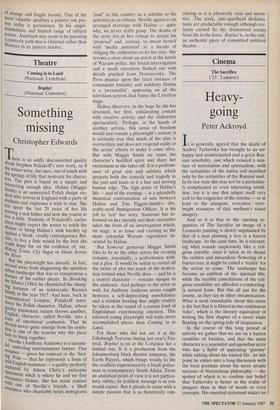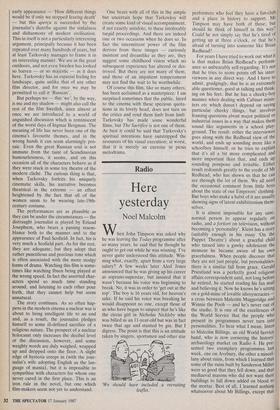Cinema
Heavy-
Peter Ackroyd
It is generally agreed that the death of Andrey Tarkovsky has brought to an un- happy and unanticipated end a great Rus- sian sensibility, one which evinced a mix- ture of nationalism and spiritualism, with the certainties of the native soil matched only by the certainties of the Russian soul. In its raw state this may not be a particular- ly complicated or even interesting condi- tion, but it is one that adapts itself very well to the exigencies of the cinema — or at least to the plangent, evocative, over- bright resources of that medium's visual imagery.
And so it is that in the opening se- quences of The Sacrifice an image of a Leonardo painting is slowly supplanted by that of a man planting a tree in a barren landscape. At the same time, he is recount- ing what sounds suspiciously like a reli- gious parable; since it takes as its theme the sudden and miraculous flowering of a barren tree, it might be called a 'trailer' for the action to come. The landscape has become an emblem of the spiritual life, while the terrible consolations of the reli- gious sensibility are afforded a comforting- ly natural form. But this all par for the course, as they say in other circumstances. What is most remarkable about this scene is the fact that it is filmed in one continuous `take', which is the literary equivalent of writing the first chapter of a novel while floating on the spring-tide of inspiration.
In the course of this long period of activity we gather that we are on a barren coastline of Sweden, and that the main character is a journalist and quondam actor who has a habit of appearing 'gloomy' while talking about his wasted life. At this point he enters into a long discussion with the local postman about the more arcane recesses of Nietzschean philosophy — the upshot of which is to confirm our belief that Tarkovsky is better in the realm of imagery than in that of words or even concepts. His essential statement makes an early appearance — 'How different things would be if only we stopped fearing death' — but this apercu is succeeded by the journalist's diatribe against the sinfulness and disharmony of modern civilisation. This in itself is not a particularly interesting argument, principally because it has been repeated over many hundreds of years, but at least Tarkovsky manages to frame it in an interesting manner. We are in the great outdoors, and not even Sweden has looked so barren — or so majestic — as it does here. Tarkovsky has an especial feeling for landscape, quite unlike that of any other film director, and for once we may be permitted to call it 'Russian'.
But perhaps we — this 'we', by the way, is me and my shadow — might also call the rest of the film Swedish, since almost at once we are introduced to a world of anguished discussion which is reminiscent of the worst days of Ingmar Bergman. The meaning of life has never been one of the cinema's favourite themes, and in the wrong hands it can seem alarmingly pro- saic. Even the great Russian soul is not immune from the taint of Scandinavian humourlessness, it seems, and on this occasion all of the characters behave as if they were stuck in some toy theatre of the modern cliché. The curious thing is that, when Tarkovsky forfeits his uniquely cinematic skills, his narrative becomes theatrical in the extreme — an effect heightened by the fact that all of the women seem to be wearing late-19th- century costume.
The performances are as plausible as they can be under the circumstances — the distraught journalist is played by Erland Josephson, who bears a passing resem- blance both to the manner and to the appearance of Paul Scofield. In fact, his is very much a Scofield part. As for the rest, they are adequate; but they adopt that rather punctilious and precious tone which is often associated with the more stodgy forms of drama. Watching this film is some- times like watching Ibsen being played at the wrong speed. In fact the assorted char- acters spend so much time standing around, and listening to each other pour forth, that they cannot help but seem unnatural.
The story continues. As so often hap- pens in the modern cinema a nuclear war is about to bring intelligent life to an end and, as a result, the journalist pledges himself to some ill-defined sacrifice of a religious nature. The prospect of a nuclear holocaust only increases the decibel level of the discussion, however, and some weighty words are duly weighed, wrapped up and dropped onto the floor. A slight edge of hysteria creeps in (with the jour- nalist's wife adopting English as the lan- guage of mania), but it is impossible to sympathise with characters for whom one never cared in the first place. This is an iron rule in the novel, but one which film-makers seem not yet to understand. One bears with all of this in the simple but uncertain hope that Tarkovksy will create some kind of visual accompaniment, if not exactly antidote, to these intolerably turgid proceedings. And there are indeed one or two occasions when he does so. In fact the intermittent power of the film derives from these images — curiously insistent and dreamlike as they are, they suggest some childhood vision which no subsequent experience has altered or des- troyed. But there are not many of them, and those of an impatient temperament may not find the wait to be worthwhile.
Of course this film, like so many others, has been acclaimed as a masterpiece: I am surprised sometimes that the public, lured to the cinema with these specious quota- tions in its lovely head, does not turn on the critics and rend them limb from limb. Tarkovsky has made some wonderful films, but The Sacrifice is not one of them. At best it could be said that Tarkovsky's spiritual intentions have outstripped the resources of his visual execution; at worst, that it is merely an exercise in pious melodrama.











































 Previous page
Previous page